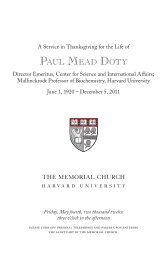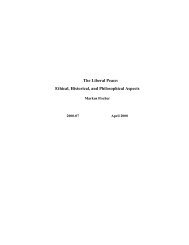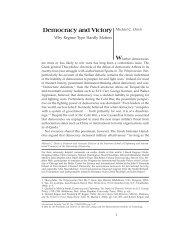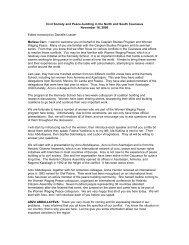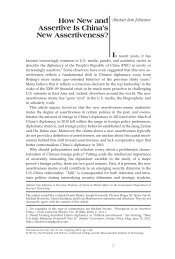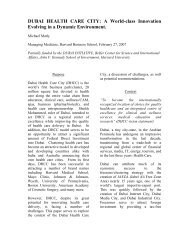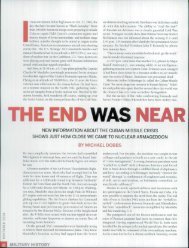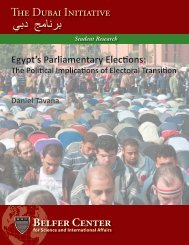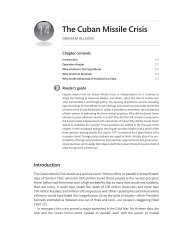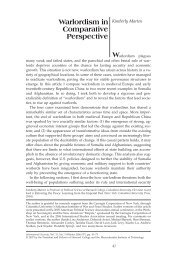October 27, 1962: Transcripts of the Meetings of the ExComm
October 27, 1962: Transcripts of the Meetings of the ExComm
October 27, 1962: Transcripts of the Meetings of the ExComm
Create successful ePaper yourself
Turn your PDF publications into a flip-book with our unique Google optimized e-Paper software.
International Security 12:3 j 50<br />
BUNDY: That <strong>the</strong> knockdown in this White House statement this morning was<br />
well received.12 Finletter's report is in. Hare's long telegram is in. They<br />
all make <strong>the</strong> same proposition, that if we appear to be trading our-<br />
<strong>the</strong> defense <strong>of</strong> Turkey for <strong>the</strong> threat to Cuba we-we will-we just<br />
have to face a radical decline in <strong>the</strong>- -<br />
JFK: Yes, but I should say that also, as <strong>the</strong> situation is moving, Mac, if we<br />
don't for <strong>the</strong> next twenty-four or forty-eight hours, this trade has<br />
appeal. Now if we reject it out <strong>of</strong> hand and <strong>the</strong>n have to take military<br />
action against Cuba, <strong>the</strong>n we also face a decline. Now <strong>the</strong> only thing<br />
we've got for which I would think we'd be able to hold general support<br />
would be-well let's try to word it so that we don't harm NATO-but<br />
<strong>the</strong> thing that I think everybody would agree to-while <strong>the</strong>se matters,<br />
which are complicated, are discussed, <strong>the</strong>re should be a cessation <strong>of</strong><br />
work. Then I think we can hold general support for that. If <strong>the</strong>y don't<br />
agree to that, <strong>the</strong> Soviet Union, <strong>the</strong>n we retain <strong>the</strong> initiative.<br />
The Prospect <strong>of</strong> War and <strong>the</strong> Elements <strong>of</strong> a Way Out<br />
The President directs attention to what he regards as <strong>the</strong> consequences <strong>of</strong><br />
failing to agree to <strong>the</strong> Soviet <strong>of</strong>fer to trade missiles: if a standstill agreement<br />
is not reached, and no trade takes place, <strong>the</strong>n <strong>the</strong> United States will be forced<br />
to attack Cuba. The result will probably be a Soviet counter<strong>of</strong>fensive-per-<br />
haps <strong>the</strong> seizure <strong>of</strong> West Berlin or a counter-attack on <strong>the</strong> Turkish missiles,<br />
or both. The President does not believe <strong>the</strong> NATO allies understand that war<br />
is imminent and that if war comes in Cuba, <strong>the</strong>y will stand vulnerable to a<br />
Soviet attack, all because <strong>the</strong>y were reluctant to trade <strong>of</strong>f a few obsolete<br />
missiles in Turkey. The President seems to believe that he cannot get his<br />
trade without a NATO meeting, that such a meeting is unlikely to support<br />
a trade in any event, that <strong>the</strong> Soviets will <strong>the</strong>refore continue working on <strong>the</strong><br />
missile sites and thus that <strong>the</strong> U.S. must, bereft <strong>of</strong> any o<strong>the</strong>r diplomatic<br />
options, destroy <strong>the</strong> missile sites before <strong>the</strong>y are completed. He wants this<br />
communicated to <strong>the</strong> NATO allies: without a trade, <strong>the</strong> risk <strong>of</strong> war that<br />
escalates from Cuba to Europe is unacceptably high.<br />
Two very different reactions are provoked by <strong>the</strong> President's dark and<br />
blunt portrayal <strong>of</strong> <strong>the</strong> situation, both motivated quite clearly by <strong>the</strong> wish to<br />
12. Bundy here refers to <strong>the</strong> "White House Statement on Soviet Proposals," <strong>October</strong> <strong>27</strong>, <strong>1962</strong>,<br />
in which <strong>the</strong> U.S. acknowledged getting "several inconsistent and conflicting proposals . . .<br />
made by <strong>the</strong> USSR within <strong>the</strong> last twenty-four hours." See David L. Larson, The "Cuban Crisis"<br />
<strong>of</strong> <strong>1962</strong>, 2nd ed. (Lanham, Md.: University Press <strong>of</strong> America, 1986), pp. 186-87.



